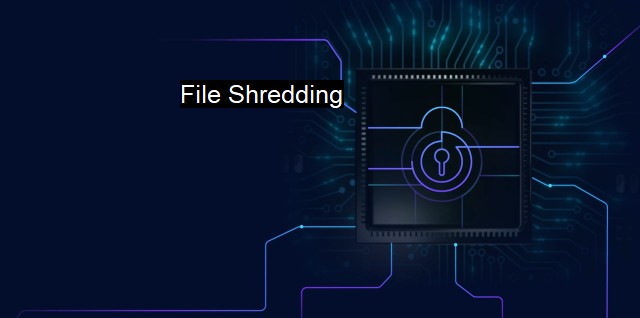What is File Shredding?
The Importance of File Shredding: Safeguarding Digital Data in the Age of Cyber Threats
File shredding is a critical component within the realm of cybersecurity and antivirus efforts. To fully comprehend the importance of file shredding, we must first understand the function and purpose it stipulates. The term refers to the process of permanently deleting data or files from a storage device, removing all chances of retrieval, or recovery, ensuring stringent data privacy.When you seemingly delete a file on your computer, the data is not entirely gone. This is a misconception that some fall into thinking. The operating system merely allows that specific portion of the storage drive to be overwritten. As a result, the data exist on your hard disk, leaving the door open for reputed hackers adept at data retrieval techniques exploiting this vulnerability. This overlooking of dormant data presents a substantial risk, primarily when the data pertains to confidential or sensitive information. That's where file shredding comes into play.
File shredding acts much like a paper shredder, which cuts the paper into tiny, unrecognizable pieces. Correspondingly, software file shredders work similarly. They obliterate the data entirely, making it irrecoverable by taking a series of steps to ensure the deleted files can never be recompiled or otherwise brought back from digital oblivion. This is done by overwriting the data several times using various patterns, increasing the levels of data security.
Not only does it overwrite the files, but file shredding programs also often remove the link to the data file system, another protection layer for sensitive or confidential information. This allows room for the creation of a fresh slate of data on the device while effectually eliminating any trace of the previously existing data. The method by which files are shredded depends on the file shredder software utilized, as different algorithms and overwrite cycles are used, each presenting its level of security provisions.
From a commercial standpoint, file shredding is a common practice among companies dealing extensively with personal or classified data and cannot afford a data breach. Industries such as finance, healthcare, technology, and defence are prime examples where file shredding is necessary as a basic security measure. Companies are inclined to deploy cutting-edge software to keep the Pittsburghs from being victimized by potential cyber-attacks aimed at revealing their confidential data.
As for personal users, antivirus programs have since started integrating file shredding as an added functionality. Recognizing the imperative nature of cybersecurity on an individual level, software creators are frequently incorporating new security features to obliterate data in a fail-proof, non-retrievable manner. With this in hand, everyday users like us can avoid being vulnerable to cybercriminals who might peep into our discarded files furnished with highly-personal, sensitive data.
File shredding plays a vital role within the spectrum of cybersecurity measures, aiming to protect classified data from any potential threats fully. It stands as a strong line of defense that denies hackers or any unauthorized individuals the chance to recover these sensitive files. It's an absolute necessity in an era where data is indomitably available and assailable. With antivirus platforms increasingly making it available alongside, file shredding is arguably an indispensable aspect of data security and cyber protection norms.

File Shredding FAQs
What is file shredding in the context of cybersecurity and antivirus?
In the context of cybersecurity and antivirus, file shredding is a process of permanently deleting sensitive or confidential data from a computer or device to ensure that it cannot be recovered by any means.How does file shredding help prevent data breaches?
File shredding helps prevent data breaches by ensuring that sensitive or confidential data is irretrievably destroyed, making it impossible for hackers or cybercriminals to steal or recover it.What are the different methods of file shredding?
The different methods of file shredding include overwriting the data with random characters, erasing the data multiple times, physically destroying the storage device, and using specialized file shredding software.Is file shredding necessary for personal computers or devices?
File shredding is not always necessary for personal computers or devices, but it is recommended for anyone who stores sensitive or confidential information on their computer or device. It can help prevent identity theft, data breaches, or other security risks that could result from a lost, stolen, or compromised device.| | A | | | B | | | C | | | D | | | E | | | F | | | G | | | H | | | I | | | J | | | K | | | L | | | M | |
| | N | | | O | | | P | | | Q | | | R | | | S | | | T | | | U | | | V | | | W | | | X | | | Y | | | Z | |
| | 1 | | | 2 | | | 3 | | | 4 | | | 7 | | | 8 | | |||||||